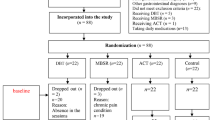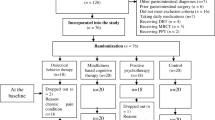Abstract
Background
Irritable bowel syndrome (IBS) is a functional disorder of the lower gastrointestinal (GI) tract affected by stress, which may benefit from a biopsychosocial treatment approach such as mindfulness-based stress reduction (MBSR).
Purpose
A treatment as usual (TAU) wait-list controlled trial was conducted in Calgary, Canada to investigate the impact of MBSR on IBS symptoms. It was hypothesized that MBSR patients would experience greater reduction in overall IBS symptom severity and self-reported symptoms of stress relative to control patients.
Method
Ninety patients diagnosed with IBS using the Rome III criteria were randomized to either an immediate MBSR program (n = 43) or to wait for the next available program (n = 47). Patients completed IBS symptom severity, stress, mood, quality of life (QOL), and spirituality scales pre- and post-intervention or waiting period and at 6-month follow-up. Intent-to-treat linear mixed model analyses for repeated measures were conducted, followed by completers analyses.
Results
While both groups exhibited a decrease in IBS symptom severity scores over time, the improvement in the MBSR group was greater than the controls and was clinically meaningful, with symptom severity decreasing from constantly to occasionally present. Pre- to post-intervention dropout rates of 44 and 23 % for the MBSR and control groups, respectively, were observed. At 6-month follow-up, the MBSR group maintained a clinically meaningful improvement in overall IBS symptoms compared to the wait-list group, who also improved marginally, resulting in no statistically significant differences between groups at follow-up. Improvements in overall mood, QOL, and spirituality were observed for both groups over time.
Conclusions
The results of this trial provide preliminary evidence for the feasibility and efficacy of a mindfulness intervention for the reduction of IBS symptom severity and symptoms of stress and the maintenance of these improvements at 6 months post-intervention. Attention and self-monitoring and/or anticipation of MBSR participation may account for smaller improvements observed in TAU patients.



Similar content being viewed by others
References
Drossman DA. Diagnosing and treating patients with refractory functional gastrointestinal disorders. Ann of Intern Med. 1995;123:688–97.
Thompson WG, Creed F, Drossman DA, Heaton K, Mazzacca G. Functional bowel disorders and chronic functional abdominal pain. Gastroenterol Int. 1992;5:75–91.
Boyce PM, Koloski NA, Talley NJ. Irritable bowel syndrome according to varying diagnostic criteria: are the new Rome II criteria unnecessarily restrictive for research and practice? Am J Gastroenterol. 2000;95:3176–83.
Hillila MT, Farkkila MA. Prevalence of irritable bowel syndrome according to different diagnostic criteria in a non-selected adult population. Aliment Pharmacol Ther. 2004;20:339–45.
Hungin AP, Whorwell PJ, Tack J, Mearin F. The prevalence, patterns and impact of irritable bowel syndrome: an international survey of 40,000 subjects. Aliment Pharmacol Ther. 2003;17:643–50.
Mearin F, Badia X, Balboa A, Baro E, Caldwell E, Cucala M, Diaz-Rubio M, Fueyo A, Ponce J, Roset M, Talley NJ. Irritable bowel syndrome prevalence varies enormously depending on the employed diagnostic criteria: comparison of Rome II versus previous criteria in a general population. Scand J Gastroenterol. 2001;36:1155–61.
Thompson WG, Irvine EJ, Pare P, Ferrazzi S, Rance L. Functional gastrointestinal disorders in Canada: first population-based survey using Rome II criteria with suggestions for improving the questionnaire. Dig Dis Sci. 2002;47:225–35.
Harvey RF, Salih SY, Read AE. Organic and functional disorders in 2000 gastroenterology outpatients. Lancet. 1983;1:632–4.
Talley NJ, Gabriel SE, Harmsen WS, Zinmeister AR, Evans RW. Medical costs in community subjects with irritable bowel syndrome. Gastoenterology. 1995;109:1736–41.
Agreus L, Svardsudd K, Talley NJ, Jones MP, Tibblin G. Natural history of gastroesophageal reflux disease and functional abdominal disorders: a population-based study. Am J Gastroenterol. 2001;96:2905–14.
Ford AC, Talley NJ, Schoenfeld PS, Quigley EM, Moayyedi P. Efficacy of antidepressants and psychological therapies in irritable bowel syndrome: systematic review and meta-analysis. Gut. 2009;58:367–78.
Burnett CK, Drossman DA. Irritable bowel syndrome and other functional gastrointestinal disorders. In: Haas L, editor. Handbook of primary care psychology. Oxford: Oxford University Press; 2005. p. 411–24.
Drossman DA. The functional gastrointestinal disorders and the Rome III process. Gastroenterology. 2006;130:1377–90.
Hammerle CW, Surawicz CM. Updates on treatment of irritable bowel syndrome. World J Gastroenterol. 2008;14:2639–49.
McLaughlin J. The brain–gut axis in health and disease. J R Coll Physicians Lond. 2000;34:475–7.
Cumberland P, Sethi D, Roderick PJ, Wheeler JG, Cowden JM, Roberts JA, Rodrigues LC, Hudson MJ, Tompkins DS, IID Study Executive. The infectious intestinal disease study of England: a prospective evaluation of symptoms and health care use after and acute episode. Epidemiol Infect. 2003;130:453–60.
de Weid D, Diamant M, Fodor M. Central nervous system effects of the neurohypophyseal hormones and related peptides. Front Neuroendocrinol. 1993;14:251–302.
Mulak A, Bonaz B. Irritable bowel syndrome: a model of the brain–gut interactions. Med Sci Monit. 2004;10:RA55–62.
Mayer EA, Naliboff BD, Chang L, Coutinho SV. Stress and the gastrointestinal tract V. Stress and irritable bowel syndrome. Am J Physiol Gastrointest Liver Physiol. 2001;280:G519–24.
Murray CD, Flynn J, Ratcliffe L, Jacyna MR, Kamm MA, Emmanuel AV. Effect of acute physical and psychological stress on gut autonomic innervation in irritable bowel syndrome. Gastroenterology. 2004;127:1695–703.
Whitehead WE, Crowell MD, Robinson JC, Heller BR, Schuster MM. Effects of stressful life events on bowel symptoms: subjects with irritable bowel syndrome compared with subjects without bowel dysfunction. Gut. 1992;33:825–30.
Bennett EJ, Tennant CC, Piesse C, Badcock CA, Kellow JE. Level of chronic life stress predicts clinical outcome in irritable bowel syndrome. Gut. 1998;43:256–61.
Blanchard EB, Lackner JM, Jaccard J, Rowell D, Carosella AM, Powell C, Sanders K, Krasner S, Kuhn E. The role of stress in symptom exacerbation among IBS patients. J Psychosom Res. 2008;64:119–28.
Dancey CP, Whitehouse A, Painter J, Backhouse S. The relationship between hassles, uplifts and irritable bowel syndrome: a preliminary study. J Psychosom Res. 1995;39:827–32.
Levy RL, Cain KC, Jarrett M, Heitkemper MM. The relationship between daily life stress and gastrointestinal symptoms in women with irritable bowel syndrome. J Behav Med. 1997;20:177–93.
American College of Gastroenterology Task Force on Irritable Bowel Syndrome, Brandt LJ, Chey WD, Foxx-Orenstein AE, Schiller LR, Schoenfeld PS, Spiegel BM, Talley NJ, Quigley EM. An evidence-based position statement on the management of irritable bowel syndrome. Am J Gastroenterol 2009;104 Suppl 1:S1-35.
Kabat-Zinn J. Full catastrophe living. New York: Bantam Dell; 1990.
Carlson LE, Speca M, Patel KD, Goodey E. Mindfulness-based stress reduction in relation to quality of life, mood, symptoms of stress, and immune parameters in breast and prostate cancer outpatients. Psychosom Med. 2003;65:571–81.
Carlson LE, Speca M. Mindfulness-based cancer recovery: a step-by-step MBSR approach to help you cope with treatment and reclaim your life. Oakland: New Harbinger Publications; 2011.
Grossman P, Niemann L, Schmidt S, Walach H. Mindfulness-based stress reduction and health benefits: a meta-analysis. J Psychosom Res. 2004;57:35–43.
Kearney DL, McDermott K, Martinez M, Simpson TL. Association of participation in a mindfulness programme with bowel symptoms, gastrointestinal symptom-specific anxiety and quality of life. Aliment Pharmacol Ther. 2011;34:363–73.
Gaylord SA, Palsson OS, Garland EL, Faurot KR, Coble RS, Mann JD, Frey W, Leniek K, Whitehead WE. Mindfulness training reduces the severity of irritable bowel syndrome in women: results of a randomized controlled trial. Am J Gastroenterol. 2011;106:1678–88.
Dapoigny M, Stockbrugger RW, Azpiroz F, Collins S, Coremans G, Muller-Lissner S, Oberndorff A, Pace F, Smout A, Vatn M, Whorwell P. Role of alimentation in irritable bowel syndrome. Digestion. 2003;67:225–33.
Francis CY, Morris J, Whorwell PJ. The irritable bowel severity scoring system: a simple method of monitoring irritable bowel syndrome and its progress. Aliment Pharmacol Ther. 1997;11:395–402.
Patrick DL, Drossman DA, Frederick IO, DiCesare J, Puder KL. Quality of life in persons with irritable bowel syndrome: development and validation of a new measure. Dig Dis Sci. 1998;43:400–11.
Drossman DA, Patrick DL, Whitehead WE, Toner BB, Diamant NE, Hu Y, Jia H, Bangdiwala SI. Further validation of the IBS-QOL: a disease specific quality-of-life questionnaire. Am J Gastroenterol. 2000;95:999–1007.
McNair DD, Lorr M, Droppelman LF. Profile of mood states. San Diego: Educational and Industrial Testing Service; 1971.
Leckie MS, Thompson E. Symptoms of stress inventory. Seattle: University of Washington; 1979.
Carlson LE, Thomas BC. Development of the Calgary symptoms of stress inventory (C-SOSI). Int J Behav Med. 2007;14:249–56.
Peterman AH, Fitchett G, Brady MJ, Hernandez L, Cella D. Measuring spiritual well-being in people with cancer: the functional assessment of chronic illness therapy—spiritual well-being scale (FACIT-sp). Ann Behav Med. 2002;24:49–58.
Garland S, Carlson L, Cook S, Lansdell L, Speca M. A non-randomized comparison of mindfulness-based stress reduction and healing arts program for facilitating post-traumatic growth and spirituality in cancer outpatients. J Sup Care Cancer. 2007;15:949–61.
Kabat-Zinn J, Lipworth L, Burney R. The clinical use of mindfulness meditation for the self-regulation of chronic pain. J Behav Med. 1985;8:163–90.
Kabat-Zinn J. An outpatient program in behavioral medicine for chronic pain patients based on the practice of mindfulness meditation: theoretical considerations and preliminary results. Gen Hosp Psychiatry. 1982;4:33–47.
Kabat-Zinn J, Massion AO, Kristeller J, Peterson LG, Fletcher KE, Pbert L, Lenderking WR, Santorelli SF. Effectiveness of a meditation-based stress reduction program in the treatment of anxiety disorders. Am J Psychiatry. 1992;149:936–43.
Kabat-Zinn J, Wheeler E, Light T, Skillings A, Scharf MJ, Cropley TG, Hosmer D, Bernhard JD. Influence of a mindfulness-based stress reduction intervention on rates of skin clearing in patients with moderate to severe psoriasis undergoing phototherapy (UVB) and photochemotherapy (PUVA). Psychosom Med. 1998;60:625–32.
Miller JJ, Fletcher K, Kabat-Zinn J. Three-year follow-up and clinical implications of a mindfulness meditation-based stress reduction intervention in the treatment of anxiety disorders. Gen Hosp Psychiatry. 1995;17:192–200.
Kaplan KH, Goldenberg DL, Galvin-Nadeau M. The impact of a meditation-based stress reduction program on fibromyalgia. Gen Hosp Psychiatry. 1993;15:284–9.
Speca M, Carlson LE, Goodey E, Angen M. A randomized, wait-list controlled clinical trial: the effect of a mindfulness meditation-based stress reduction program on mood and symptoms of stress in cancer outpatients. Psychosom Med. 2000;62:613–22.
Reibel DK, Greeson JM, Brainard GC, Rosenzweig S. Mindfulness-based stress reduction and health-related quality of life in a heterogeneous patient population. Gen Hosp Psychiatry. 2001;23:183–92.
Weissbecker I, Salmon P, Studts JL, Floyd AR, Dedert EA, Sephton SE. Mindfulness-based stress reduction and sense of coherence among women with fibromyalgia. Journal of Clinical Psychology in Medical Settings. 2002;9:297–307.
Whitehead WE, Schuster MM. Gastrointestinal disorders: behavioral and physiological bases for treatment. New York: Academic Press; 1985.
Kolski NA, Talley NJ, Boyce PM. Predictors of health care seeking for irritable bowel syndrome and nonulcer dyspepsia: a critical review of the literature on symptom and psychosocial factors. Am J Gastroenterol. 2001;96:1340–9.
Acknowledgments
Dr. Linda E. Carlson holds the Enbridge Research Chair in Psychosocial Oncology, co-funded by the Alberta Cancer Foundation and the Canadian Cancer Society Alberta/NWT Division. She is also an Alberta Heritage Foundation for Medical Research Health Scholar. This research was supported by a Calgary Health Region/Centre for the Advancement of Health Research Grant awarded to Dr. Carlson. Kristin Zernicke holds a Canadian Institute of Health Research—Frederick Banting and Charles Best Canada Graduate Scholarship, an Alberta Innovates—Health Solutions Studentship, and a Psychosocial Oncology Research Training Fellowship. We would like to thank our dedicated MBSR instructors, research assistants, and the patients who participated in this research. Without them, this research would not be possible.
Conflict of interest
None.
Author information
Authors and Affiliations
Corresponding author
Rights and permissions
About this article
Cite this article
Zernicke, K.A., Campbell, T.S., Blustein, P.K. et al. Mindfulness-Based Stress Reduction for the Treatment of Irritable Bowel Syndrome Symptoms: A Randomized Wait-list Controlled Trial. Int.J. Behav. Med. 20, 385–396 (2013). https://doi.org/10.1007/s12529-012-9241-6
Published:
Issue Date:
DOI: https://doi.org/10.1007/s12529-012-9241-6




